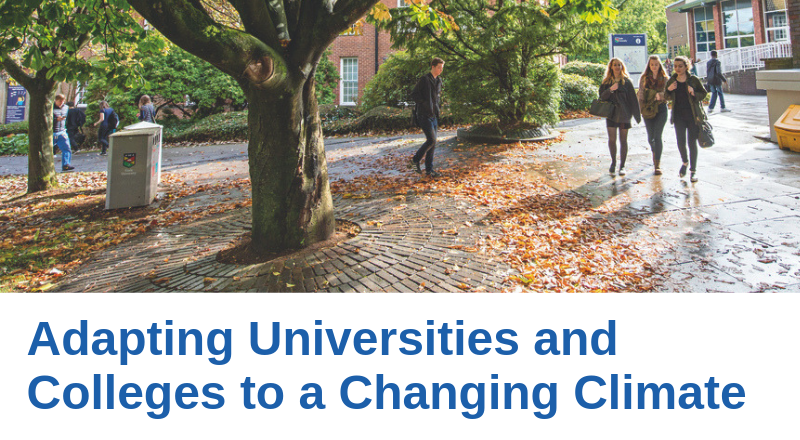Climate change is not only a risk in itself to operational, teaching and research activities, but also a multiplier of many other risks
EAUC and HEBCoN (the Higher Education Business Continuity Network) are delighted to launch a new set of guides and resources on Adapting universities and colleges to a changing climate: Making the case and taking action.
Climate change is not only a risk in itself to operational, teaching and research activities, but also a multiplier of many other risks. It is vital that considerations of climate change risks and how these risks can be minimised (through adaptation actions), do not become siloed within the remit of Sustainability or Estates Teams.
Developed by a Working Group of FHE sustainability and risk professionals with the support of adaptation specialists from AECOM, three new sets of resources highlight why, and how, to effectively embed considerations of climate change risk within your existing risk and business continuity procedures.
The main guide, Adapting universities and colleges to a changing climate: Making the case and taking action, provides a range of support, from an initial self-assessment on climate readiness and an example Elevator Pitch to use to communicate the need for investment in adaptation, to climate projections, examples of risks, opportunities and potential adaptation actions, and a compilation of resources to support action in your institution.
The accompanying guide, Using an existing organisational resilience framework to develop a Climate Change Adaptation Plan, provides advice on embedding climate change risks within existing risk and business continuity procedures at your institution. This guide provides a step-by-step advice on running your own Business Impact Assessment workshops to evaluate the risks presented by climate change to key organisational functions, and deciding on the necessary actions to take to reduce any significant risks.
Additionally, accompanying case studies and example Adaptation Strategies from universities and colleges around the UK are collated to provide further support.
Find the full set of Climate Change Adaptation resources on the Sustainability Exchange.
EAUC and HEBCoN would like to thank all members of the Climate Change Adaptation Working Group who have offered valuable insights and experiences, as well as all others within the sector who have provided resources to support the project. In addition, AECOM’s support for this piece of work has been invaluable, and the time and expertise in climate change adaptation which they have dedicated to the project is very much appreciated.
Climate change is not only a risk in itself to operational, teaching and research activities, but also a multiplier of many other risks. It is vital that considerations of climate change risks and how these risks can be minimised (through adaptation actions), do not become siloed within the remit of Sustainability or Estates Teams.
Developed by a Working Group of FHE sustainability and risk professionals with the support of adaptation specialists from AECOM, three new sets of resources highlight why, and how, to effectively embed considerations of climate change risk within your existing risk and business continuity procedures.
The main guide, Adapting universities and colleges to a changing climate: Making the case and taking action, provides a range of support, from an initial self-assessment on climate readiness and an example Elevator Pitch to use to communicate the need for investment in adaptation, to climate projections, examples of risks, opportunities and potential adaptation actions, and a compilation of resources to support action in your institution.
The accompanying guide, Using an existing organisational resilience framework to develop a Climate Change Adaptation Plan, provides advice on embedding climate change risks within existing risk and business continuity procedures at your institution. This guide provides a step-by-step advice on running your own Business Impact Assessment workshops to evaluate the risks presented by climate change to key organisational functions, and deciding on the necessary actions to take to reduce any significant risks.
Additionally, accompanying case studies and example Adaptation Strategies from universities and colleges around the UK are collated to provide further support.
Find the full set of Climate Change Adaptation resources on the Sustainability Exchange.
EAUC and HEBCoN would like to thank all members of the Climate Change Adaptation Working Group who have offered valuable insights and experiences, as well as all others within the sector who have provided resources to support the project. In addition, AECOM’s support for this piece of work has been invaluable, and the time and expertise in climate change adaptation which they have dedicated to the project is very much appreciated.











